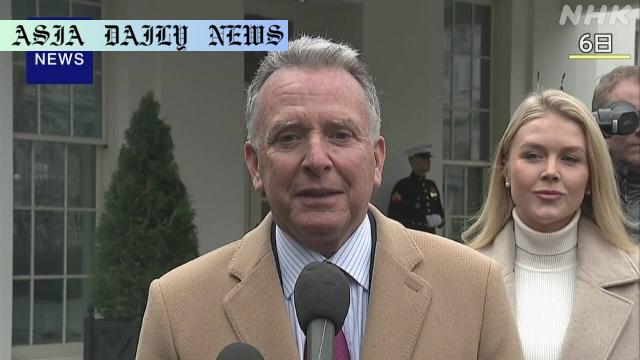Ceasefire – US special envoy Steve Witkoff arrives in Moscow to discuss a 30-day ceasefire proposal, signaling a collaborative effort.
Ceasefire proposal initiates high-level diplomatic engagement between US and Russia.
Ukraine expresses willingness to accept the 30-day ceasefire plan.
US envoy Steve Witkoff meets Russian officials for discussions in Moscow.
Russia indicates readiness to deliberate and awaits clarity on US-Ukraine talks.

The Recent Diplomatic Initiative for Ceasefire
The international community witnessed a significant step forward in diplomatic efforts as US special envoy Steve Witkoff arrived in Moscow to deliberate on a US-proposed 30-day ceasefire plan. This development has come against the backdrop of prolonged tensions and hostilities between Russia and Ukraine, coupled with intricacies involving global superpowers. The United States has taken a proactive stance, seeking both clarity and commitment from Russia regarding this peace initiative, reflecting a possible thaw in negotiations on the international stage.
US Leadership and Strategic Commitment
US President Donald Trump underscored the importance of international cooperation and accountability, reinforcing that clear confirmation of Russia’s position on the ceasefire is critical. His decision to send Witkoff to Moscow marks a decisive step towards potentially stabilizing one of the most significant conflict zones in recent history. Such moves indicate that geopolitical issues, especially around Europe, remain at the forefront of US foreign policy. This proactive engagement by the US reflects not only the nation’s strategic interests but also its commitment to global peacekeeping initiatives in coordination with allies such as Ukraine.
The Willingness of Allies and Russia’s Pending Response
Ukraine’s prompt acceptance of the proposed 30-day ceasefire showcases its readiness to collaborate in achieving peace. This move is not solely an indication of resilience but also a reaffirmation of Ukraine’s belief in diplomatically negotiated solutions. On the other hand, Russia, though open to discussions as noted by Foreign Ministry spokesperson Maria Zakharova, is taking a calculated approach. It has made it clear it will finalize any position post-discussions and evaluation of US-Ukraine outcomes held in Saudi Arabia. These developments underscore the complexities of the ongoing conflict, where every party seeks to secure its national interests while cautiously edging towards collaborative solutions.
Political Implications of the Ceasefire Proposal
If successfully implemented, the proposed ceasefire could usher in a new chapter in the Russia-Ukraine conflict, paving the way for further confidence-building measures and escalated dialogue. However, the situation remains fluid with skepticism revolving around long-term compliance, given the entrenched distrust among the factions. The 30-day pause could serve as not just a breathing window to de-escalate tensions but also as a framework for deeper cooperation in resolving territorial and political disputes. The global community keenly watches this diplomatic tango, knowing how its outcomes could influence wider geopolitical alignments.
Broader Ramifications and Future Prospects
These ongoing negotiations also present an opportunity for a broader partnership or at least amicable interactions between conflicting countries while under constant observation by the global audience. The US’s role introduces not only power-balancing dynamics but also amplified expectations towards a long-term settlement. While there is cautious optimism, hurdles persist, and it will require sustained and transparent dialogue to break through the historical animosities once intertwined with national pride and territorial assertions.



Commentary
Analyzing the Geopolitical Significance of the Ceasefire Proposal
The decision by the United States to spearhead a 30-day ceasefire in the Russia-Ukraine conflict reflects an ambitious and strategic move towards conflict resolution and peace-building. Such initiatives often carry both hope and skepticism, especially when dealing with prolonged and entrenched disputes like this one. However, this particular development provides an intriguing glimpse into the dynamics of modern-day geopolitics, cooperation, and mutual interests.
The Role of the US in Global Peace Initiatives
The involvement of the United States highlights its agenda of reasserting moral and strategic leadership on the global front. By pushing forward a specific time-bound peace proposal, it not only indicates urgency but also its determination to mediate successfully between conflicting nations. The dispatch of envoy Steve Witkoff directly underscores this intent. The larger implication here reflects an active superpower consciously positioning itself as a peace enforcer, one with leverage to negotiate bilaterally with Russia, a significant geopolitical rival.
Challenges in Establishing Trust and Cooperation
However, neither the proposals nor the positive responses thus far can entirely dispel the historical mistrust lingering between Russia, Ukraine, and external mediators like the US. It is plausible that any negotiations involving Russia might factor in geopolitical PR optics just as much as genuine intent. Furthermore, practical challenges, such as compliance monitoring during a ceasefire period and underlying territorial disputes, remain critical concerns. Without a transparent framework for implementation, initiatives such as these can falter quickly or be co-opted into serving individual interests.
Optimism Regarding Peace Prospects
Despite these challenges, the international community cautiously welcomes the possibility of a reduced-risk environment in Ukraine, even if temporary. A short-term pause can offer civilians, regions, and nations time to negotiate human rights assurances, manage humanitarian aid, and rebuild diplomatic relationships. Success with this plan may even act as a model blueprint for future troubled regions, reaffirming the role of international mediators in conflict zones today. A careful balance of optimism and strategic intent will ultimately dictate success.